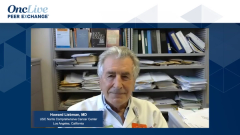
Eltrombopag in Chronic Immune Thrombocytopenia
Expert panelists consider clinical trial data on and personal experience with using eltrombopag, an oral TPO-RA, in immune thrombocytopenia.
Episodes in this series

Transcript:
Morey Blinder, MD: Do you want to talk about the RAISE trial and the EXTEND trial after that, and comment on the bottom-line conclusions from those early studies?
Howard Liebman, MD: We did RAISE and we did EXTEND. In fact, I had a patient who persisted on the drug eltrombopag for 11 years. I think that's beyond extension, but the patient was very happy with the drug. The fact is that there are ups and downs with all TPO agonists, and with eltrombopag, it sometimes varies with diet, but the overall data on RAISE is that there were very low incidents of complications. The hepatic changes are usually seen early and can be reversed by stopping the drug; sometimes they are transient, actually, and there are elevated enzymes. We sent out a report, and we don't know if it's going to be published yet, but we have evidence in our Latino population that you see a little more of those elevations of liver enzymes with eltrombopag if the patient has fatty liver changes, but they are reversed when you stop the drug.
The other issue is with the patient I mentioned with 11 years. She was doing beautifully. She was on the RAISE trial, on the original trial, and on her extension period afterward, she all of a sudden lost efficacy. The reason was her husband had become ill and unfortunately, he developed a primary tumor. She was changing their diet to take care of him, and she was changing her diet, and basically, it really was the first proof that changing the dietary pattern that she had developed had an impact on probably the absorption of the drug. When she switched back and we became alert to that, she went back into an excellent response for years. In fact, the dose was reduced over the years, and we can talk a little later about the long-term use of it. After 11 years, and this was an older lady, she was only taking the drug twice a week and maintaining a platelet count of nearly 100,000. This phenomena of developing what I would call some kind of immune tolerance in the disease is now well characterized and was seen early on actually in a few cases that Dave Kuter, MD, [at the Cancer Center, Mass General Research Institute, Boston, MA] did with romiplostim. He had some patients who were post-splenectomy, and all of the sudden, after years on the drug, they actually developed a spontaneous remission, and [INAUDIBLE] and Marc Michel, MD, of the Center of Reference for Rare Systemic Autoimmune Diseases in Paris, France, that treated a lot of the ITP patients on eltrombopag, actually reported in the literature a number of cases who went into long-term, unmaintained remissions treated with eltrombopag. So, I think that's a phenomenon that is very promising, and I think that patients who stay on the drug a long time seem to actually even do better over time. You probably had patients on it a good deal longer than a year or 2, and I think this is a phenomenon of developing immune tolerance.
Morey Blinder, MD: That's interesting. I definitely have seen that. I've also had anecdotes similar to yours with the dietary effect too, so, I think that's important to double check that history if you have somebody that responded and then didn't respond or something like that. Something that doesn't seem quite right.
Transcript edited for clarity.











































